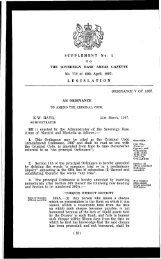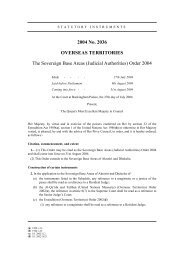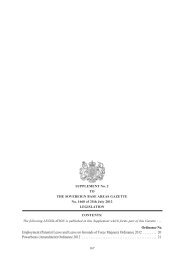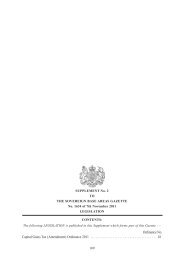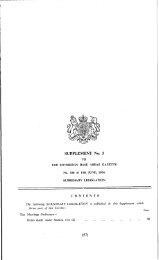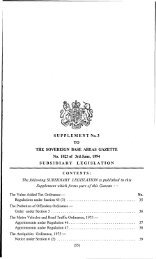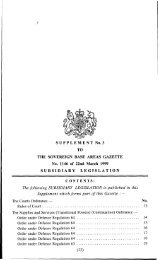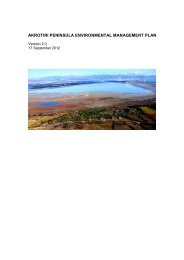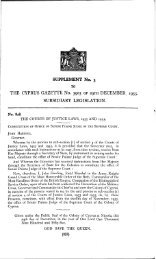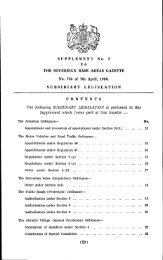The Criminal Procedure (Customs and - Sovereign Base Areas Cyprus
The Criminal Procedure (Customs and - Sovereign Base Areas Cyprus
The Criminal Procedure (Customs and - Sovereign Base Areas Cyprus
Create successful ePaper yourself
Turn your PDF publications into a flip-book with our unique Google optimized e-Paper software.
Ordinance 23 of 2013<br />
Published in Gazette No. 1711 of 19th August 2013<br />
CRIMINAL PROCEDURE (CUSTOMS AND IMMIGRATION) ORDINANCE 2013<br />
An Ordinance to apply certain provisions of the <strong>Criminal</strong> <strong>Procedure</strong> Ordinance to officers of the<br />
<strong>Sovereign</strong> <strong>Base</strong> <strong>Areas</strong> <strong>Customs</strong> <strong>and</strong> Immigration Service<br />
J. S. Wright 15th August 2013.<br />
DEPUTY ADMINISTRATOR<br />
BE it enacted by the Administrator of the <strong>Sovereign</strong> <strong>Base</strong> <strong>Areas</strong> of Akrotiri <strong>and</strong> Dhekelia as<br />
follows:—<br />
1. Short title<br />
This Ordinance may be cited as the <strong>Criminal</strong> <strong>Procedure</strong> (<strong>Customs</strong> <strong>and</strong> Immigration) Ordinance 2013.<br />
2. Commencement<br />
This Ordinance comes into force on 17 August 2013.<br />
3. Arrest by customs officers: certain provisions of <strong>Criminal</strong> <strong>Procedure</strong> Ordinance apply<br />
(1) Where a customs officer(a) or a control officer exercises a power of arrest, section 9<br />
(arrest) <strong>and</strong> section 10 (search of arrested person) of the <strong>Criminal</strong> <strong>Procedure</strong> Ordinance(b)<br />
apply as if any reference in those provisions to a police officer were a reference to a<br />
customs officer or, as the case may be, a control officer.<br />
(2) In this section, “control officer” means a customs officer who is also a control officer<br />
under section 3 of the Control (Entry, Settlement <strong>and</strong> Commercial Enterprises) Ordinance<br />
1960(c).<br />
Notes<br />
(a) “<strong>Customs</strong> officer” is defined in Schedule 1 to the Interpretation Ordinance 2012.<br />
(b) Cap. 155, Laws of <strong>Cyprus</strong>, 1959 ed. Legislation of the former colony of <strong>Cyprus</strong> has effect in the <strong>Areas</strong> by virtue of article 5 of the<br />
<strong>Sovereign</strong> <strong>Base</strong> <strong>Areas</strong> of Akrotiri <strong>and</strong> Dhekelia Order in Council 1960. Schedule 2 to the Interpretation Ordinance 2012 provides for the<br />
interpretation of such legislation.<br />
(c) Ordinance 5/60.<br />
189
EXPLANATORY NOTE<br />
(This note does not form part of the Ordinance)<br />
1. This explanatory note relates to the <strong>Criminal</strong> <strong>Procedure</strong> (<strong>Customs</strong> <strong>and</strong> Immigration) Ordinance<br />
2013 (the “Ordinance”). It has been prepared by the Office of the Attorney-General <strong>and</strong> Legal<br />
Adviser in order to assist the reader of the Ordinance.<br />
2. <strong>The</strong> Ordinance applies sections 9 <strong>and</strong> 10 of the <strong>Criminal</strong> <strong>Procedure</strong> Ordinance to customs<br />
officers (<strong>and</strong> any customs officers who are also control officers under the Control (Entry, Settlement<br />
<strong>and</strong> Commercial Enterprises) Ordinance 1960). When exercising a power of arrest, customs officers<br />
may use all means necessary to make the arrest (but no more force than is reasonable) <strong>and</strong> must<br />
inform the arrested person of the reason for the arrest. <strong>The</strong> arrested person may be searched, <strong>and</strong><br />
any evidence <strong>and</strong> weapons found on the arrested person may be seized.<br />
(SBA/AG/2/CR/623)<br />
190



